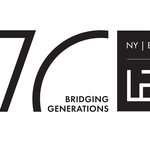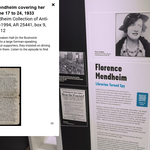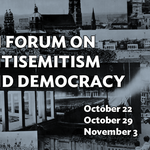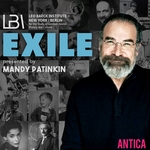Germany Marks 80 Years Since Kristallnacht with the 1938Projekt


- Author
- Dr. Miriam Bistrovic
- Date
- Fri, Nov 9, 2018
The ceremonies marking the 80th anniversary of the Kristallnacht at Berlin‘s Rykestraße Synagogue on November 9, 2018 focused on the personal stories told by documents from LBI’s 1938Projekt. The commemoration was organized by the Central Council of Jews from Germany and attended by representatives of government and civil society, including Chancellor Angela Merkel.
“None of us can predict how things will turn out, no one can take offense at our holding on for as long as possible to what we have built together, and whether what we do now or in the near future is correct cannot be judged by any one. Perhaps everything was wrong and too late.” These were the closing words of a letter written on January 5, 1938 to the Jewish co-owners of the Fleischer paper factory in Eislingen, and they were the opening words of the presentation of the 1938Projekt in the Rykestraße Synagogue last November.
The stately synagogue was brightly lit as it received its guests on a gray November morning. When it was inaugurated in 1904, the impressive edifice accommodated 2,000 worshippers, making it one of the largest synagogues in Europe. Thanks to a full restoration, it has lost none of its dignified atmosphere in 2018. A murmur passed through the crowd as the members of the Synagogal Ensemble Berlin took the stage, and then silence. All eyes turned reverently toward the dais as the choir began Louis Lewandowski’s setting of Psalm 103, “Enosh.”
The memorial service was attended by German Federal President Frank-Walter Steinmeier, Bundestag President Wolfgang Schäuble, and Chancellor Angela Merkel, who also gave the closing speech. Numerous other members of the German government, nearly every member of the Bundestag, high-ranking representatives of civil society, and other fixtures of public and religious life in Germany were among the invited guests who joined them that Friday morning.
In his rousing speech, Josef Schuster, President of the Central Council of Jews in Germany, pointed out that the violence 80 years ago to the day had not come out of nowhere. “The legal basis for the exclusion of Jews from German society, and after March 12, 1938 from Austrian society, had been long established,” he said. “Since the seizure of power in 1933, the National Socialist government had been laying the foundations for the exclusion of Jews from society.” Schuster noted LBI’s exhibition of documents from the 1938Projekt, which was on display in the synagogue. “You can see just how difficult life was made for Jews in the 1938Projekt exhibition. It offers gripping testimony that tells more than mere numbers.”
After Josef Schuster’s speech, eight stories from the 1938Projekt online calendar were brought to life in a multimedia presentation. These private glimpses into the personal experiences of German and Austrian Jews in 1938, available at www.1938projekt.org, convey an immediate impression of how the decisive events of 1938 impacted Jewish families in their daily lives. Selections from letters and other documents were read by four young Jews from the Central Council’s “Likrat” program, which arranges encounters between Jewish and non-Jewish youth. A narrator provided background information, and images from the LBI’s collections were projected on a screen. Although the authors of those letters and diary entries are no longer with us, the young reader’s brought their words and experiences to life. The audience was captivated by the way that these young people, who represent the present and future of the Jewish community in Germany, animated and honored the fates of German Jews from a prior generation.
In his remarks, Schuster drew another link between the past portrayed in the 1938Projekt and the present:
“Today, when we think of the state-organized assault on Jews 80 years ago [...], we do so not only with knowledge of the greatest crime against humanity in the history of the world and the lessons we have learned from it, but also with the knowledge that injustice still takes place today. Each of us bears a responsibility for ensuring that respect and tolerance are defining features of German society. What we need now are courageous and committed democrats. We need people, who show civil courage. People who open their mouths. [...] If we don’t stand up for the values of our constitution in small matters, for human dignity, then we cannot expect it to function in large matters.”
Chancellor Merkel echoed this sentiment in her closing remarks, declaring:
“[...] we can only learn the right lessons for us today and in the future if we consider the November Pogroms of 1938 to be part of a process that was not only followed by the terrible chapter that was the Shoah, but also had a pre-history. Because in this way we can see what the consequences are if—as under National Socialism—what was once punishable behavior is first tolerated and then, ultimately, declared to be desirable behavior. Prejudices that had previously or always been held could now give way to open violence with impunity. This was accompanied by a large majority of the German population looking the other way, remaining silent and indifferent and, above all, going with the flow. The political conditions changed with the liberation of Germany in May 1945 and the new start that ensued. The normative delineation of racism and antisemitism was fundamental. However, racism, antisemitism, and prejudice did not simply disappear.”
The topics discussed in the 1938Projekt such as forced migration, discrimination, and exclusion are just as relevant today as the connected issues of acculturation, identities, and civic engagement. They do not appear there as mere abstractions, however, but always linked to the fates of individuals. Historical events and political decisions of the year 1938 are not conveyed through dates and victim counts, but through the lives of people impacted by them.
Chancellor Merkel reflected on the importance of honoring the lives and loss of individuals in her speech:
“It is for this reason that pausing to reflect and remember together on days such as these is important. [...] This is about people at the end of the day. Each and every one of them had a name, a unique dignity and identity. Calling to mind this identity and dignity helps us not to get bogged down in loss. It helps us not to decouple memory from our present-day lives, but to keep connecting with the past and, based on this, to shape the future —a future in which we recognize the human face in every person and in which we encounter one another as fellow members of one and the same human race.”





